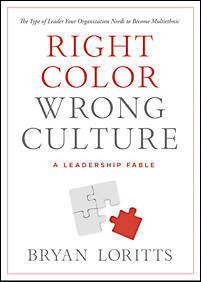A few weeks ago, I had the privilege of hearing Bryan Loritts speak at the ERLC National Conference in Nashville, TN. While I’m familiar with his and his father’s ministries as Bryan pastored Fellowship Memphis Church and his father Crawford pastors Fellowship Church here in the Atlanta area, I’d not before had the privilege of hearing Bryan speak. Wow! I was extremely blessed to hear his thoughts in a session regarding Pursuing Multi-Ethnic Cultural Engagement. His gospel-soaked presentation caused me to want to learn more, so I picked up Right Color Wrong Culture, a leadership fable about Multiethnic organizations he had written from the conference bookstore.
I finally had a chance to sit down and read this book last week and was immediately drawn to the fact that the story was set in Memphis, TN…my hometown. That quickly drew me in with some of the connections that were made to restaurants, activities, and most importantly the culture of the city I grew up in. This book is a powerful read on what it truly means to build relationships with brothers and sisters of different cultures when everyone is starting with the gospel as their foundation.
Loritts uses a mix of Scripture, common sense relational strategies, sociological theory, and normal every day conversation in order to plow new ground for gospel-centered relationships that are focused on helping us build community here on earth that will mirror what we look forward to experiencing in heaven. Excellent read…strongly recommended!
I highlighted several things while reading and have posted those notes below…
- When you hire a person, you don’t just hire their competencies, you also hire the sum total of who they are—competence, character, and culture. You don’t want to stop with can they do the job, but you want to ask, can they be what this job needs?
- Never hire a person of a different ethnicity without someone of that ethnicity in the room during the interview. As the old saying goes, it takes one to know one.
- For though I am free from all, I have made myself a servant to all, that I might win more of them. To the Jews I became as a Jew, in order to win Jews. To those under the law I became as one under the law (though not being myself under the law) that I might win those under the law. To those outside the law I became as one outside the law (not being outside the law of God but under the law of Christ) that I might win those outside the law. To the weak I became weak, that I might win the weak. I have become all things to all people, that by all means I might save some. I do it all for the sake of the gospel, that I may share with them in its blessings. (1 Corinthians 9:19-23 ESV)
- A C2 leader is going to look at this staff and realize the the leadership community is nowhere near where it should be in its ethnic and cultural makeup. He knows some changes need to be made, but he also knows those changes won’t come overnight. He’ll gently and methodically building up relational capital with the powers that be and make the strategic hires necessary.
- We have bombarded the throne room of heaven ever time we’ve needed to add a new leader to our ministry.
- What I have learned over the years is that C2 leadership is essential at the highest echelons of any organization if they want to be multiethnic. A C2 is a person who is culturally flexible and adaptable without becoming ethnically ambiguous or hostile. Paul point to this in 1 Corinthians 9:19-23 when he said that he had become all things to all people. a C2 leader has a wide range of relationships and can navigate various ethnicities and cultures while maintaining his unique identity all at once. C2s are typically classified by high levels of cultural intelligence and sensitivity. They not only are committed to nudging the organization forward in matters of ethnicity, but they also know the rate in which they need to push without alienating their constituency.
- You cannot occupy a position on our executive team unless you are a C2. It’s just too valuable to our vision and mission to lower our standards.
- Hiring a C2 leader is not the finish line, it’s really just the beginning. Because C2’s are made and not born, we constantly need to develop our C2 muscles. Our teams at the church read and discuss books, take trips together in which we are culturally stretched, and even watch provocative films that give us a runway to share our stories and learn from one another.
- “What makes you pound the table and weep?” Crawford Loritts


